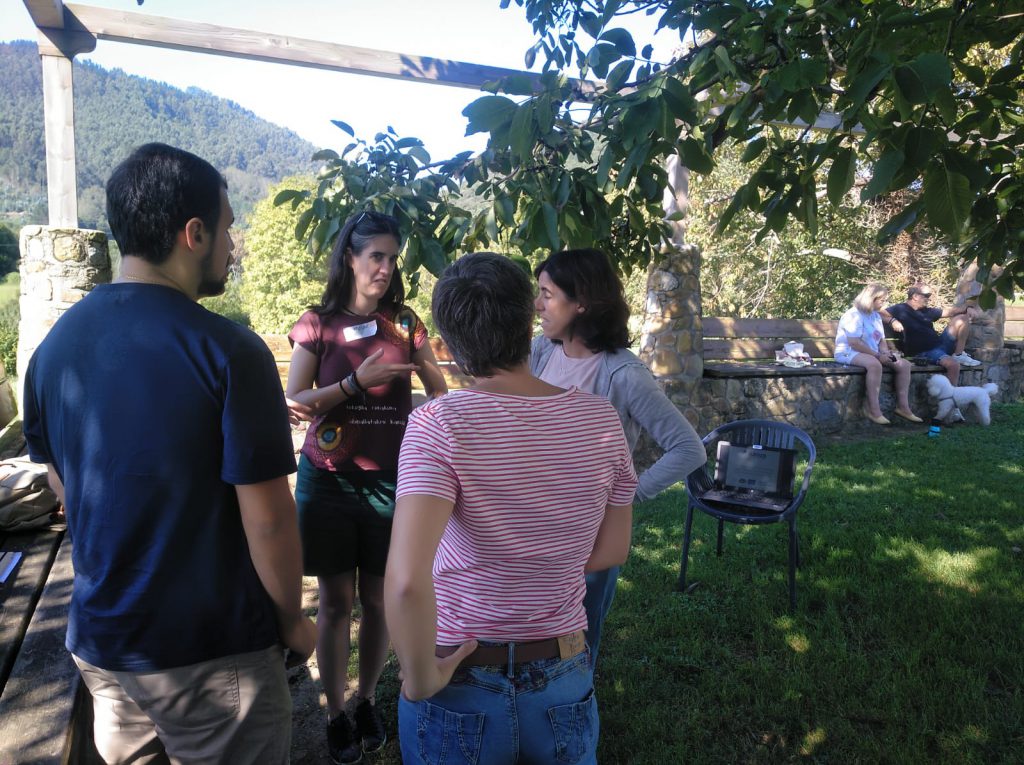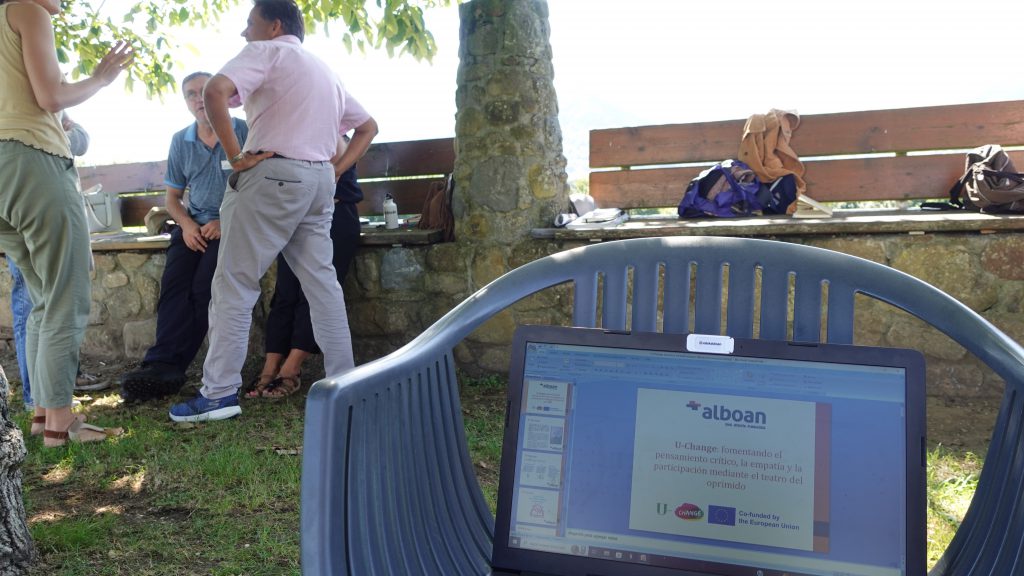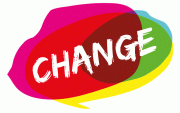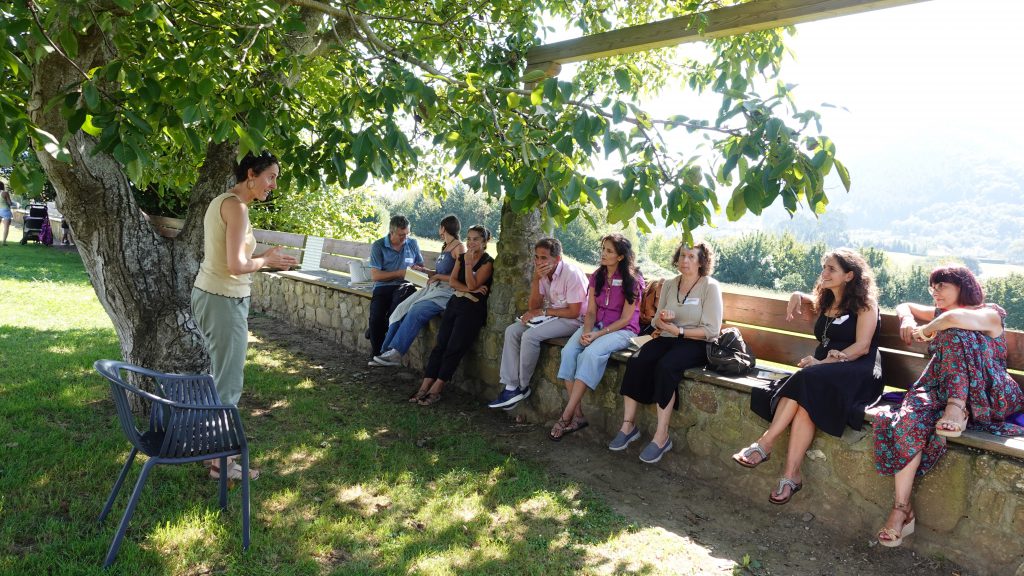Last Saturday, October 7th, Edukalboan, a community of educators promoted by the Alboan Foundation that contributes to social transformation and the construction of global citizenship through education, held its 10th Meeting. In coherence with the title of the meeting, “Educate with care(s)”, the event took place at the Ekoetxea Urdaibai, a space whose objective is to promote knowledge and care of nature.
During the Meeting, a specific workshop on the Change Projects was held, the objective of which is to support teachers in the implementation of training itineraries on migration and refuge in which critical thinking, empathy and participation skills are encouraged among students to promote a local society open to the integration of migrants and refugees.
The workshop was divided into two parts: during the first, we presented the conclusions and recommendations of the U-Change project, a contribution also to the Change Environment project that we are currently promoting strongly. We mainly addressed the following aspects:
- The need to combat deep-seated prejudices.
- The importance of creating safe spaces where all people can talk and feel welcomed, especially students with a history of forced migration.
- Recommendations for carrying out meaningful meetings with migrants.

The second part of the workshop consisted of identifying conflicts that were poorly addressed in educational centres and testing appropriate responses, taking into account the recommendations of the first part of the workshop. For this, the methodology of the Theater of the Oppressed was used.
The theatre of the oppressed is a theatrical trend systematized by the Brazilian playwright, actor, director and theatre pedagogue Augusto Boal. It starts from the analysis of the concerns, problems and aspirations of the community that suffers oppression, and analyzes the power relations to combat the dynamics of exclusion. The proposed scenes are intended to activate the public to contribute ideas of social transformation.
13 educators participated in the workshop and were encouraged to build scenes and intervene in them to help build a more just world. This methodology proposes precisely that: look around and look at ourselves; propose alternatives; implement and try solutions, talk and agree; and all this in the theatre of life, in this great theatre in which we are all called to be protagonists: Protagonists of change.
Identificando situaciones de exclusión y ensayando soluciones mediante el teatro del oprimido
El pasado sábado 7 de octubre Edukalboan, comunidad de educadores y educadoras promovida por Fundación Alboan que contribuye a la transformación social y a la construcción de ciudadanía global por medio de la educación, celebró su X. Encuentro. En coherencia con el título del encuentro, “Educar con cuidado(s)”, la cita tuvo lugar en la Ekoetxea Urdaibai, espacio cuyo objetivo es impulsar el conocimiento y cuidado de la naturaleza.
Durante el Encuentro se llevó a cabo un taller específico sobre los Proyectos Change, cuyo objetivo es apoyar a docentes en la implementación de itinerarios formativos sobre migración y refugio en los que se fomente el pensamiento crítico, empatía y habilidades de participación entre su alumnado para permitir una sociedad local abierta a la integración de personas migrantes y refugiadas.
El taller se dividió en dos partes: durante la primera dimos a conocer las conclusiones y recomendaciones del proyecto U-Change, un aporte también para el proyecto Change Environment que en este momento estamos impulsando con fuerza. Abordamos principalmente los siguientes aspectos:
- La necesidad de combatir prejuicios arraigados.
- La importancia de generar espacios seguros donde todas las personas puedan hablar y se sientan acogidas, especialmente estudiantes con historia de migración forzada.
- Recomendaciones para llevar a cabo encuentros significativos con personas migrantes.

La segunda parte del taller consistió en identificar conflictos mal abordados en los centros educativos y ensayar respuestas adecuadas, tomando en cuenta las recomendaciones de la primera parte del taller. Para ello se utilizó la metodología del Teatro del Oprimido.
El teatro del oprimido es una tendencia teatral sistematizada por el dramaturgo, actor, director y pedagogo teatral brasileño Augusto Boal. Parte del análisis de las inquietudes, problemas y aspiraciones de la comunidad que sufre las opresiones, y analiza las relaciones de poder para combatir las dinámicas de exclusión. Se busca que las escenas propuestas activen al público para aportar ideas de transformación social.
En el taller participaron 13 educadoras y educadores quienes se animaron a construir escenas e intervenirlas para ayudar a construir un mundo más justo. Esta metodología propone precisamente eso: mirar a nuestro alrededor y mirarnos a nosotros mismos; proponer alternativas; poner en marcha e intentar soluciones, hablar y acordar; y todo esto en el teatro de la vida, en este gran teatro en el que todos estamos llamados a ser protagonistas. Protagonistas del cambio. #IamCHANGE

